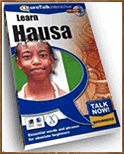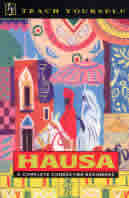

Table Of Contents
Last Updated
HAUSE LANGUAGE PHRASES
The Hausa Language Phrases
Phrase [freiz] sashen magana wadda ba fi'ili cikinta. The Hausa language phrases or the sense of
am/is/are/was/were is, regardless of aspect (or 'tense'), expressed by ne if the subject is masculine
or ce if it is feminine.
As no gender distinction is made in noun plurals, ne is always used with plural forms.
"TO BE" : Ne, Ce and Ke nan.
The Hausa language phrase shi ke nan, literally meaning it is this is common in the Hausa language, and is used to express
finality and, often to signal transition to a new topic similar to the notion of that's the end of the matter.
Ya mutu. Shi ke nan. Bayan wannan... He died. That was that. After this...
Ne/ce typically occurs at the end of a phrase or clause and its tone is always opposite to the tone of the preceding syllable.
| HAUSA Language Phrase | "ENGLISH Language Phrase" |
|---|---|
| Sarki ne | It is a chief |
| Yaro ne | It is a boy |
| Makaranta ce | It is a school |
| Yarinya ce | It is a girl |
| Yara ne | They are children |
| Ya tafi gida ne | He went home (emphatic) |
The construction ke nan can often be used to express the same meaning as ne/ce. The use of ka nan, however, typically implies greater emphasis than would the use of ne/ce.
| HAUSA Language Phrase | "ENGLISH Language Phrase" |
|---|---|
| Kudi ke nan | It is money |
| Sarki ke nan | It is the king! |
| Ya sami kudi ke nan | He's become really wealthy! |
| To, mun dawo gida ke nan | Well, we're back home |
In the negative, ba... ba ne/ce or ke nan is used.
| HAUSA Language Phrase | "ENGLISH Language Phrase" |
|---|---|
| Ba ido ba ne | It is not an eye |
| Ba kudi ba ke nan | It is not money! |
| Ba giwa ba ce | It is not an elephant |
| Ba yara ba ne | They are not children |
I [ayi] {ni, ne, in (kullum kan magana ne, watau subject ka fa'ili} it is I, ni ne, I am coming,
ina zuwa. I shall come, zan zo. he said that I should come, ya ce in zo. I didn't go, ban tafi ba.
The independent pronouns commonly occur with ne/ce and ke nan.
| HAUSA Language Phrase | "ENGLISH Language Phrase" |
|---|---|
| ni ne | It is I (m.) |
| ni ce | It is I (f.) |
| kai ne | It is you (m.) |
| ke ce | It is you (f.) |
| shi ne | It is he (m.) |
| ita ce | it is she |
| mu ne | It is we |
| ku ne | it is you (pl.) |
| su ne | it is they |
| Wane ne? Ni ne | Who is it? It's I |
| Shi no zai tafi | It is he who will go |
| Wa ya zo? Ni ke nan | Who has come? I |
Love [lav] kaunata, so kwarai, kauna (ya fi like karfi), ji dadin he loves tobacco,
yana son taba kwarai, he loves the cinema, yana jin dadin kallon sinima kwarai.
Kauna, so, soyayya Audu fell in love with Kande, son Kande ya kama Audu. Lovely [lavli] kyakkyawa.
| HAUSA Language Phrase | "ENGLISH Language Phrase" |
|---|---|
| gari | town |
| ido | eye |
| kai | head |
| kasuwa (f.) | market |
| ina son ka | I love you |
| harshen Hausa tutorial | Hausa language tutorial |
| i miss ka | I miss you |
| yadda za a yi magana da Hausa sarai | How to speak hausa fluently |
| kudi | money |
| kyau | goodness |
| laifi | fault, sin |
| makaranta (f.) | School |
| saniya (f.) (pl. shanu) | Cow (pl. cattle) |
| sarki | Chief |
| yarinya (f.) | Girl |
| yaro (pl. yara) | Boy (pl. children) |
| wa, wane, wanene? | Who? |
| dawo | Return (here), come back |
| shiga | enter, go in |
| tafi | go (away), go (to) |
| ba laifi | that's okay (lit. there's nothingwrong), never mind |
| da kyau | Good! |
| shi ke nan | That's that |
| Ya yi aiki mai kyau | He did good work |
| An yi ruwa | It (has) rained |
| Ya yi girma | He's big. Or He grew up |
| Mun yi yawo | We wandered about |
| Abinci ya yi | The food is ready |
| Ya yi karya | He lied |
| Ya yi barci | He slept |
| Na yi masa magana | I talked to him (about a specific topic) |
Hausa, like other languages, has its share of exclamatory utterances. These expressions are usually specialized particles, though certain
nominals, verbals and stylized phrases amy also be employed as exclamations.
The following exclamations have been used:
| HAUSA Language Phrase | "ENGLISH Language Phrase" |
|---|---|
| a | no |
| babu | no! (emphatically) |
| don Alla | Please |
| shi ke nan | that's that! |
| ai | Why!, well! |
| albarka | No sale! |
| amin | May it be so, amen |
| ashe | Well!, is that so? |
| haba | Nonsense, come now! |
| I | Yes |
| madalla | Fine, praise God! |
| mana | indeed |
| tabai | (Utter amazement) |
| to | well, okay |
| yauwa | Fine, okay |
| kai | Wow! Good Heavens! |
| sannu | Greetings! |
| Alla ya ba mu... | May God give us... |
| Alla ya sa | May God bring (it) about |
| bakin daji | Forest (lit. dark bushland) |
| ci bashi | Incur a debt |
| duk da haka | In spite of this, nevertheless, yet |
| loto-loto | From time to time |
| zura da gudu | Break into a run |

